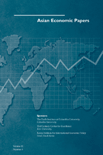
Asian Economic Papers
Scope & Guideline
Exploring the nexus of economics and politics in Asia.
Introduction
Aims and Scopes
- Economic Development and Policy Analysis:
The journal emphasizes research that critically examines economic development strategies in Asian countries, analyzing policy implications and outcomes. - Trade and Globalization:
A core focus area includes the dynamics of trade relations, protectionism, and the impact of globalization on Asian economies, particularly in the context of recent geopolitical tensions. - Technological Innovation and Economic Growth:
Research exploring the intersection of technological advancements, productivity, and economic growth is prominent, highlighting how innovation drives development in the region. - Environmental Economics and Sustainability:
The journal pays attention to environmental issues, particularly how economic activities intersect with sustainability goals, including studies on decarbonization and green technologies. - Labor Economics and Demographic Changes:
Labor market dynamics, wage differentials, and the impacts of demographic shifts on economic performance are significant themes, providing insights into workforce challenges in Asia. - Urban Economics and Regional Development:
Research examining the relationship between urbanization, economic growth, and policy responses in Asian cities reflects the journal's commitment to understanding regional development.
Trending and Emerging
- Impact of COVID-19 on Economic Systems:
The pandemic has catalyzed significant research on its economic impacts, leading to studies on recovery strategies, changing consumer behaviors, and the resilience of economic systems across Asia. - Green Economy and Sustainability Initiatives:
A growing body of work focuses on green technologies and sustainable practices, particularly in response to climate change, highlighting the importance of environmental economics in policy discussions. - Digital Transformation and Its Economic Implications:
Research exploring the effects of digital technologies on productivity, labor markets, and trade dynamics is increasingly prominent, reflecting the rapid pace of digitalization in Asia. - Geopolitical Economic Shifts:
The ongoing geopolitical tensions, particularly between the US and China, have prompted more studies on regional responses to trade wars and economic decoupling, indicating a rising interest in geopolitical economics. - Urbanization and Smart City Development:
Papers exploring the economic implications of urbanization and the development of smart cities are on the rise, showcasing the intersection of technology, urban planning, and economic growth.
Declining or Waning
- Traditional Economic Theories:
There appears to be a waning interest in traditional economic theories that do not incorporate contemporary issues such as digital transformation and climate change, as researchers seek more relevant frameworks. - Macro-Economic Stability Studies:
Research focused on macroeconomic stability and growth in isolation from other factors has declined, indicating a shift towards more integrated approaches that consider multiple influences on economic performance. - Sector-Specific Analyses:
Papers that solely analyze specific sectors without connecting them to broader economic or social issues are less common, suggesting a trend towards interdisciplinary research. - Historical Economic Analysis:
There is a noticeable decrease in publications centered on historical economic analyses of Asian economies, possibly overshadowed by the urgency of current economic challenges.
Similar Journals
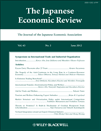
JAPANESE ECONOMIC REVIEW
Advancing insights into Japan's economic landscape.Japanese Economic Review, published by Springer Heidelberg, is a renowned academic journal that aims to advance the understanding of economic processes within the context of Japan and the Asia-Pacific region. With an ISSN of 1352-4739 and E-ISSN of 1468-5876, this journal features high-quality research articles that span a broad range of topics in economics and econometrics. Ranked in the Q2 category for Economics and Econometrics as of 2023, it holds a Scopus rank of #332 out of 716, placing it in the 53rd percentile among its peers. Although not Open Access, the journal invites contributions that provide insights and empirical analyses beneficial to both academics and practitioners. Emphasizing a deep understanding of economic dynamics, the Japanese Economic Review is essential reading for anyone interested in the implications of economic policies and trends, making it a significant platform for scholarly dialogue and research dissemination.
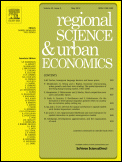
REGIONAL SCIENCE AND URBAN ECONOMICS
Unveiling the complexities of regional science and urban economics.Regional Science and Urban Economics, published by Elsevier, is a premier academic journal dedicated to advancing the understanding of spatial dynamics and urbanization. With an ISSN of 0166-0462 and E-ISSN 1879-2308, this journal has established itself as a vital resource for researchers and practitioners in economics and urban studies, boasting a remarkable impact factor and ranking in the Q1 category for both fields. Since its inception in 1975, the journal has provided a platform for high-quality research that examines both theoretical and empirical aspects of regional science and urban economics. With a Scopus rank of 47th in Urban Studies and 157th in Economics, it ensures that the latest findings reach a wide audience. Researchers interested in exploring spatial economics and urbanization trends will find this journal indispensable for staying at the forefront of their fields, facilitating collaboration and innovation in addressing contemporary urban challenges.
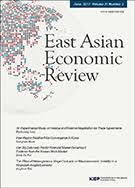
East Asian Economic Review
Exploring the Dynamics of East Asia's Economy.East Asian Economic Review is a premier academic journal dedicated to the multifaceted exploration of economic issues and developments in East Asia. Published by the Korea Institute for International Economic Policy, this journal serves as a vital platform for researchers, practitioners, and policymakers interested in the region's economic dynamics. Since transitioning to Open Access in 2013, it has enhanced accessibility, allowing for a broader dissemination of knowledge and fostering collaborative research. While the journal currently does not have an impact factor rating, its commitment to high-quality research continues to attract contributions that significantly advance the understanding of economic policies, trade relations, and market trends in East Asia. The East Asian Economic Review stands out as an essential resource for anyone involved in or studying the intricate economic landscape of one of the world's most dynamic regions.
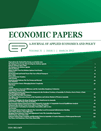
Economic Papers
Pioneering Thought in Economics, Econometrics, and Finance.Economic Papers is a prestigious journal published by WILEY, recognized for its contributions to the fields of economics, econometrics, and finance since its inception in 1982. With an impressive impact factor reflecting its scholarly influence, this journal is ranked in the Q2 category in the Economics, Econometrics, and Finance sector, placing it among the top 30% of journals in the field. The journal aims to disseminate high-quality research that addresses contemporary economic challenges, thereby advancing both theoretical understanding and practical applications. While currently not available as open access, Economic Papers provides vital insights for researchers, professionals, and students striving to deepen their comprehension of economic dynamics and contribute to sound policy-making. Scholars are encouraged to submit their work to engage with a robust academic community and impact the discourse in economic research.
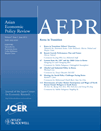
Asian Economic Policy Review
Pioneering discussions in regional economic policy.Asian Economic Policy Review, published by Wiley, serves as a pivotal platform for advancing understanding and discourse in the fields of economics, econometrics, finance, and political science. Established in 2008 and set to converge through 2024, this esteemed journal boasts a remarkable Q1 category ranking in multiple fields, including Economics, Management, and Political Science, while consistently engaging leading-edge research reflective of the global economic landscape. With an impressive Scopus rank placing it in the top percentiles, particularly in General Economics and Political Science, the journal acts as a vital source for both academics and practitioners. Although it does not operate under an Open Access model, its comprehensive content is widely accessible through institutional subscriptions. Researchers, policymakers, and students alike will find Asian Economic Policy Review invaluable for its inclusive analysis and policy insights pertinent to both regional and international economic frameworks.
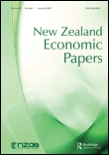
New Zealand Economic Papers
Navigating the complexities of economics with scholarly precision.New Zealand Economic Papers is a prominent academic journal dedicated to the field of economics, published by Taylor & Francis Ltd. With its ISSN 0077-9954 and E-ISSN 1943-4863, this journal has been a significant contributor to economic discourse since its inception in 1966, continuing to provide valuable insights through to 2024. As part of the third quartile (Q3) in the Economics, Econometrics and Finance category, it ranks at #165 out of 288 in Scopus, placing it within the 42nd percentile, demonstrating its respectable impact in the academic community. Although the journal does not offer open access, it remains a vital resource for researchers, professionals, and students interested in understanding economic dynamics, policy analysis, and applied econometrics, particularly in the context of New Zealand. The journal's commitment to rigorous research ensures that it continues to play a crucial role in shaping economic policy and academic thought across the globe.
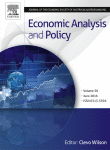
Economic Analysis and Policy
Advancing Economic Thought Through Rigorous ResearchEconomic Analysis and Policy is an esteemed academic journal published by ELSEVIER, dedicated to advancing the field of economics and econometrics since its inception in 1970. Based in the Netherlands, this journal plays a pivotal role in disseminating high-quality research that addresses contemporary economic issues and policy challenges. With an impressive Q1 ranking in both the Economics and Econometrics categories, and recognition in the top 91st percentile of Scopus rankings, it is a leading platform for scholars, professionals, and students seeking to contribute to and engage with the evolution of economic thought. The journal does not currently operate on an open access model, allowing it to maintain rigorous peer-review standards that ensure the integrity and impact of published research. As a vital resource for anyone interested in the intersection of theory and policy in economics, Economic Analysis and Policy fosters a community committed to rigorous analysis and innovative solutions in the economic domain.

Quantitative Economics
Driving innovation in economics through open-access research.Quantitative Economics is a leading open-access journal published by WILEY, dedicated to advancing the field of economics through rigorous quantitative analysis. Established in 2010 and based in the United States, this influential journal boasts an impressive Q1 rating in the 2023 category of Economics and Econometrics, reflecting its high impact and quality within the field. With a Scopus ranking of #222 out of 716 in the Economics and Econometrics category, it sits comfortably in the 68th percentile, underscoring its relevance to researchers and professionals alike. The journal accepts a wide range of submissions, including original research articles, methodological advancements, and comprehensive reviews, which contribute to the understanding and application of quantitative methods in economic research. By providing immediate open access to all published articles, Quantitative Economics ensures that vital findings are readily available to academics, policymakers, and students across the globe, enhancing collaboration and innovation within the discipline.

Prague Economic Papers
Pioneering Economic Research with a Global PerspectivePrague Economic Papers is an esteemed scholarly journal dedicated to the fields of Economics, Finance, and Econometrics, published by UNIV ECONOMICS-PRAGUE. With its ISSN 1210-0455 and E-ISSN 2336-730X, this journal serves as a vital platform for innovative economic research and theoretical advancement. Operating from the scenic backdrop of the Czech Republic, Prague Economic Papers is recognized in Scopus with rankings that place it in quartile Q4 for Economics and Econometrics, as well as Q3 for Finance, reflecting its growing impact in the academic sphere. Though the journal does not currently offer open access, it ambitiously covers a wide expanse of economic theories and empirical studies, contributing significantly to the evolution of economic thought from 2008 to 2024. Researchers, professionals, and students alike will find this journal essential for accessing critical insights and methodologies that shape contemporary economic discourse.
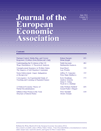
Journal of the European Economic Association
Connecting Scholars with Cutting-Edge Economic ResearchThe Journal of the European Economic Association, published by Oxford University Press, stands as a cornerstone in the field of economics, boasting a strong impact factor that reflects its high citation rates and significance among peers. With an impressive Scopus ranking of 12 out of 288 in general economics, encompassing a remarkable 96th percentile, this journal is recognized for its rigorous peer-reviewed research contributions that advance the understanding of economic theory and policy. Dedicated to publishing innovative studies and theoretical advancements since its inception in 2003, it continues to engage scholars worldwide, providing vital insights applicable to both academia and industry. Although it does not follow an open-access model, the journal's extensive reach and commitment to excellence make it an essential resource for researchers, professionals, and students seeking to deepen their understanding of contemporary economic issues. Based in the United States, the journal reflects a European perspective on global economic challenges, making it indispensable for those at the forefront of economic research.